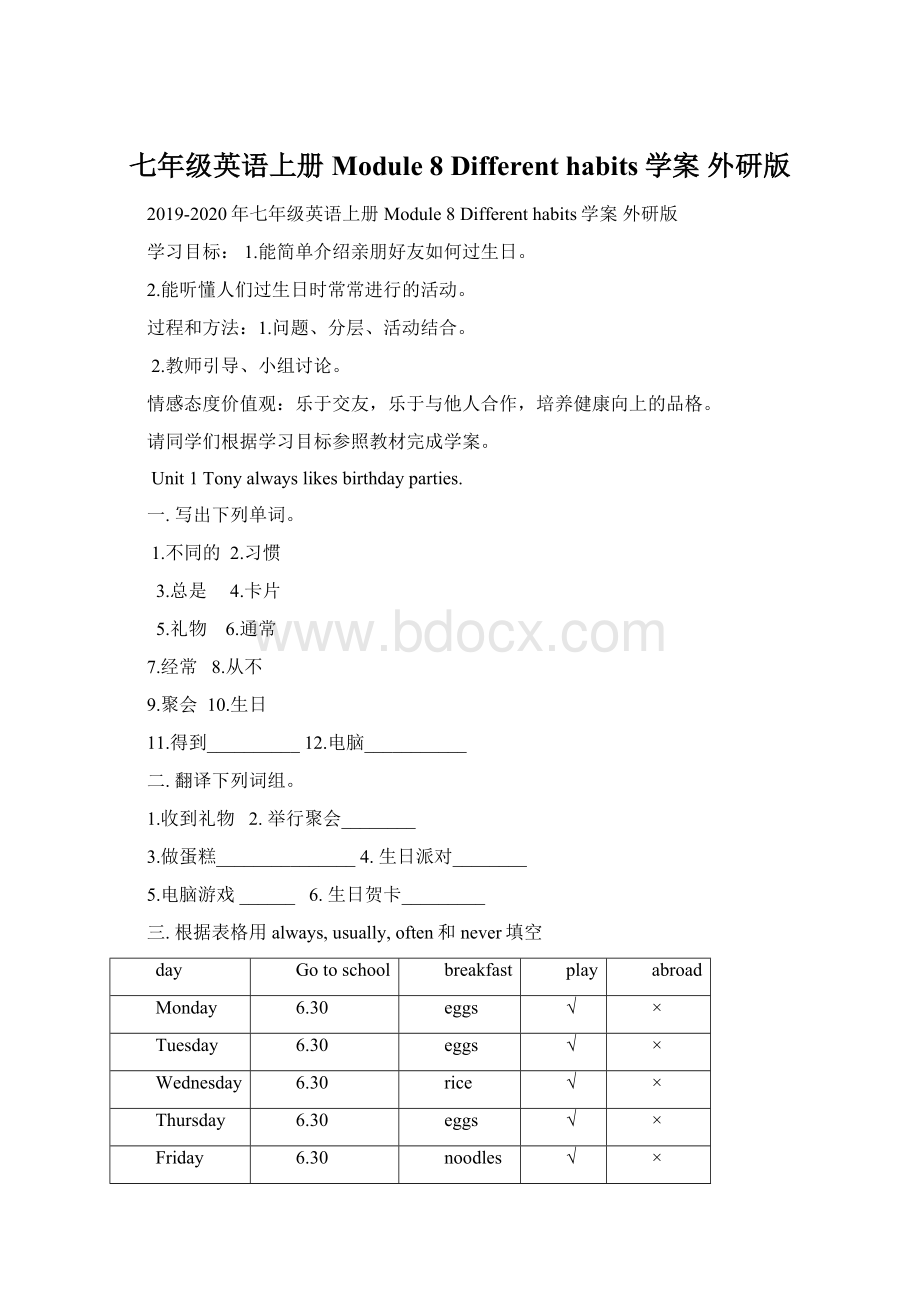七年级英语上册 Module 8 Different habits学案 外研版.docx
《七年级英语上册 Module 8 Different habits学案 外研版.docx》由会员分享,可在线阅读,更多相关《七年级英语上册 Module 8 Different habits学案 外研版.docx(26页珍藏版)》请在冰豆网上搜索。

七年级英语上册Module8Differenthabits学案外研版
2019-2020年七年级英语上册Module8Differenthabits学案外研版
学习目标:
1.能简单介绍亲朋好友如何过生日。
2.能听懂人们过生日时常常进行的活动。
过程和方法:
1.问题、分层、活动结合。
2.教师引导、小组讨论。
情感态度价值观:
乐于交友,乐于与他人合作,培养健康向上的品格。
请同学们根据学习目标参照教材完成学案。
Unit1Tonyalwayslikesbirthdayparties.
一.写出下列单词。
1.不同的2.习惯
3.总是4.卡片
5.礼物6.通常
7.经常8.从不
9.聚会10.生日
11.得到__________12.电脑___________
二.翻译下列词组。
1.收到礼物2.举行聚会________
3.做蛋糕_______________4.生日派对________
5.电脑游戏______6.生日贺卡_________
三.根据表格用always,usually,often和never填空
day
Gotoschool
breakfast
play
abroad
Monday
6.30
eggs
√
×
Tuesday
6.30
eggs
√
×
Wednesday
6.30
rice
√
×
Thursday
6.30
eggs
√
×
Friday
6.30
noodles
√
×
Saturday
6.30
eggs
√
×
Sunday
6.30
eggs
×
×
1.Jim_______goestoschoolathalfpastsix.
2.Jim______eatseggsforbreakfast.
3.Jim_____playsbasketball.
4.Jim____goestoabroad.
四.翻译下列各句
1.让我们送给他一个生日卡片
Let’s_________hima_________card.
2.我们常常为他的生日制作蛋糕
We_______________acakefor__________________.
3.让我们举行一个生日聚会
Let’s________________________________________________.
4.星期日,我们总是去参加足球比赛
We_________gotoa______________on__________.
5.他从不玩电脑游戏
He_______plays__________________
Unit2Hisbirthdaypresentisacinematicket
一.根据中文写出英文单词。
1.票2.软运动鞋
3.牛仔裤4.音乐会
5.盒子6.丝绸
7.衬衫________8.音乐_________
9.杂志__________10.小说_______
二.翻译下列词组。
1.一盒巧克力__________________2.一张电影票_________________
3.一张音乐会票_______________4.一条牛仔裤_______________
5.一件丝绸衬衫_______________6.一双运动鞋_______________
四.pletethesentenceswithat,inoron.
Yougetupatseveno’clock.
1.Wegotoschool_______themorning.
2.Wedon’tgotoschool_______Sunday.
3.Igetup______halfpastsix.
4.YouhaveanEnglishlesson________twoo’clock.
5.Theyhaveamathslesson_________Wednesday.
6.Idomyhomework___________theevening.
五.翻译下列句子
1.她从来没去过电影院。
_______________________________
2.他喜欢读许多书和杂志。
__________________________________
3.他们总去听音乐会。
______________________________________
4.他们经常看电视。
________________________________________
Unit3Languageinuse
一.根据中文写出英文单词。
1.音乐2.衬衫
3.观看4.电脑
5.游戏_6.歌手
7.歌手___________8.选择______________
9.牛仔裤_________10.想出_____________
二.把括号里的词放在句子中正确位置。
1.Igotoschoolatsixo’clock.(always)
________________________________________________
2.HeplaysfootballonSunday.(often)
__________________________________________________
3.TheygotoEngland.(never)
___________________________________________________
4.Shegetsupatsixo’clock.(usually)
__________________________________________________
三.翻译下列句子。
1.她上学从来不迟到。
I________________late________school.
2.我总是喜欢听音乐。
I___________________________tomusic.
3.我们常常下午踢球
We_______________footballintheafternoon.
4.她从来不玩电脑游戏。
She_____________play_________________.
5.我喜欢看杂志。
Ilike_______________________.
2019-2020年七年级英语上册Module8Differenthabits教案外研版
I.Teachingobjectives模块教学目标
技
能
目
标
听
Listenandfindoutwhatpeopleusuallydoontheirbirthdays
说
Describingwhatpeopledoontheirbirthday
读
Readandmatchpeopleandpresents.
写
Writeadescriptionofyourpartner,usingpunctuation:
apostrophes
语
言
目
标
功能句式
Talkingaboutwhatyougiveonone’sbirthday:
Weusuallysendhimabirthdaycard.
Let’ssendhimabirthdaycard.
Andweoftenmakeacakeforhisbirthday.
Andwhataboutabirthdaypresent?
Let’sgivehimaputergame.
Let’sgivehimaCD.
Let’shaveabirthdayparty.
Adverbsoffrequency:
Ialwayslistentomusic.
Sheusuallywearssilkshirts.
Weoftenmakeacakeforhisbirthday.
Heneverplaysputergames.
词汇
1.重点词汇
different,habit,always,card,present,usually,often,never,get,OK,ticket,pair,trainer,jeans,T-shirt,concert,box,silk,shirt,magazine,novel,CD,choose,lot,clothes,singer,on,its,think
2.短语
apairof,lotsof,alotof,ontelevision,thinkof
重点句子
1.Tomalwayslikesbirthdayparties.
2.Let’sgotoafootballmatchonSaturday.
3.That’sagoodidea.
4.DoyouoftenwatchTV?
Yes,Ido./No,Idon’t.
5.Theyalwaysopentheirpresentsatonce.
语法
Presentsimplehe,she,it.
Adverbsoffrequency.
Possessiveadjectives
II.Teachingmaterialsanalyzing教材分析
模块8以Differenthabits为话题,围绕如何为他人挑选生日礼物展开听、说、读、写的语言实践活动,通过3个单元的学与练,旨在让学生通过这一学习与体验的过程,引导学生乐于交友,培养健康向上的品格。
同时能够就生日礼物的选择进行提问与回答,能够熟练使用频度副词。
Unit1要求学生通过听、读、说的练习,学会谈论为生日所做的准备活动。
VocabularyandListening包括5部分。
Part1要求学生根据图片找出与之相对应的单词,通过这一部分的练习,使学生在复习已有知识的基础上,学习本单元出现的语言知识,为相关语言技能的训练奠定基础;Part2要求学生根据一段听力材料,初步了解频度副词的使用;Part3要求学生俩俩对话,说说自己在生日那天的具体活动,并且要求使用频度副词;Part4要求学生通过听力练习,正确捕捉和判断听力材料中的信息,同时也为“谈论选择生日礼物”作好准备。
Part5要求学生在上一个活动的基础上,选择符合对话内容的信息。
Pronunciationandspeaking包括4部分。
Part6帮助学生掌握辅音[h],[r]的发音规律;Part7训练学生使用正确的语音;Part8要求学生大声读单词,掌握动词第三人称单数的正确读音;Part9要求学生以小组对话的形式,来检验活动2的答案,将上述所学运用到实际交往活动。
Unit2围绕“选择生日礼物”展开,包括介绍不同人物的不同爱好。
Vocabularyandreading包括3部分。
Part1要求学生通过图片选择自己的生日礼物,借以激活学生已有的相关知识储备,并熟悉本单元基本的语言知识;Part2要求学生阅读短文,选出对应的生日礼物;Part3要求学生根据短文内容完成句子,借以考查学生的理解能力。
Writingandspeaking包括3部分。
Part4对学生在写作时正确使用名词所有格符号(’)提出了要求;Part5要求学生列举自己喜欢的事情和所做的事情,为下一个环节中的对话作准备。
Unit3是一个复习单元,对学生在前两单元中业已掌握的知识技能进行总结与综合性的练习。
Languagepractice包含5部分。
Part1要求学生运用前面所学知识俩俩进行对话练习;Part2要求学生把括号中的词语填写在句中的正确位置,进一步掌握频度副词的正确使用;Part3要求学生把上下两栏的词语搭配起来,借以掌握形容词性物主代词和人称代词的宾格形式;Part4要求学生用恰当的词语完成句子,进一步掌握形容词性物主代词的正确使用。
Part5让学生写出与所给词相匹配的词语,以考查学生对本模块中出现的词汇的掌握。
Aroundtheworld介绍了在英美两国人们对生日礼物的选择和习惯。
Moduletask分两部分。
Part6要求学生能够简单描写家人或朋友的喜好,并为其挑选生日礼物。
Part7要求学生把上一个活动中的描述文出示给同伴看,进行俩俩对话,来选择生日礼物。
III.Classtypesandperiods课型设计与课时分配
Period1Listeningandreading
Period2Integratingskills(I)
Period3Readingandspeaking
Period4Readingandwriting
Period5Integratingskills(II)
IV.Teachingplansforeachperiod分课时教案
Period1Listeningandspeaking
Languagegoals语言目标
Keyvocabulary重点词汇
different,habit,always,card,present,usually,often,never,get
Abilitygoals能力目标
Enablestudentstotalkabouttheactivitiesonthebirthdays.
Teachingmethods教学方法
Listeningandspeaking.
Teachingaids教具准备
Ataperecorderandsomepictures.
Teachingproceduresandways教学过程与方式
StepILead-in
Beforeclass,prepareabirthdaycake,candlesandpresentsforsomeonewhosebirthdayisontheday.Sing“Happybirthday”whentheclassbegins.
T:
Todayis…’sbirthday.Happybirthdaytoyou!
Here’sapresentforyou.
Then,askstudentstosingthesongtogether.
Showthefollowingpictures.Talkaboutthepictures.
T:
Nowlookatthesepictures.Whatarethey?
S:
Birthdaycake,birthdaycard,birthdaypartyandbirthdaypresent.
T:
Whatdoyouusuallydoonyourbirthday?
S:
Wehavebirthdayparty.
S:
Wesharebirthdaycake.
S:
Wesendbirthdaycards.
..
Thenaskstudentstodoactivity1onpage48.
T:
Welldone!
Let’slookatactivity1onpage48.Iwillreadthroughthewordsinthebox.Andyouhavetorepeataftermechorallyandindividually.
Thenasksomestudentstoreadinclass.
T:
Nowlookatthepicture.It’saboutabirthdayparty.Thereisacake,acard,somepresentsandsomestudents.Canyoumatchthewordswiththepicture?
Givestudentsoneortwominutestodoit.Thencallbacktheanswersaspletesentencesinawhole-classsetting
StepIIPresentation
Askstudentstolookatthebox.
T:
Lookatthebox.Therearefourwordshere.Theyareadverbsoffrequency.Whenwewanttosayhowoftensomethinghappens,itismontousefrequencyadverbs.Itispossibletousethemwhenreferringtothepast,presentorfuture:
∙Weoftenwentcampingwhenwewerechildren.
∙Iusuallygotothegymatlunchtime.
∙Iwillalwaysloveyou.
Thefollowinglistshowsthemostmonadverbsoffrequency,withtheonethatreferstothingsthathappenmostoftenatthetop,andleastoftenatthebottom:
∙Always
∙Usually
∙Often
∙Sometimes
∙Never
Showthefollowingandaskstudentstoreadthesesentencesrepeatedly.
∙IalwaysbrushmyteethbeforeIgotobed.(=everynight)
∙Iusuallyhavetoastforbreakfast.(=happensmostdays)Ifrequentlywatchthenewsbeforedinner.(=it'smon)
∙Ioftengototheparkwithmydog.(=manytimes)
∙Isometimesseehimdownattheshops.(=atparticularoccasionsbutnotallthetime)
∙Ioccasionallyvisitthecapital.(=nothappeningoftenorregularly)
∙Irarelysmokecigars.(=itisnotmon)
∙Iseldomhaveachancetogotothetheatre.(=almostnever)
∙Ihardlyevertravelabroad.(=almostnever)
∙Ineverworkontheweekend.(=notatanytimeornotonanyoccasion)
Ifnecessary,explaintheaboveinChinese.
Showthefollowingformontheblackboard.
David
Tony
Daming
Bruce
Monday
√
√
√
×
Tuesday
√
√
√
×
Wednesday
√
√
√
×
Thursday
√
√
×
×
Friday
√
×
√
×
Saturday
√
√
×
×
Sunday
√
√
×
×
always
usually
often
never
Thenshowthefollowingsentencesontheblackboard.
Davidlistenstomusiceveryday.Healwayslistenstomusict.
Tonylistenstomusicon6daysoftheweek.Heusuallylistenstomusic.
Daminglistenstomusicon4daysoftheweek.Heoftenlistenstomusic.
Brucedoesn’tlistentomusiconanydayoftheweek.Heneverlistenstomusic.
T:
Soyoucansee:
always>usually>often>never.Clear?
S:
Yes.
StepIVListeningandspeaking
Askstudentstopayattentiontothesymbolsintheform.Makesuretheyunderstandthem.
T:
Nowlistentotherecordingandcheckwhatpeopleusuallydoontheirbirthdays.Afterlistening,writetheanswersintheformwiththesymbols.
Playtherecording.Aftertheyfinish,checktheiranswerswiththewholeclass.
Letthestudentsdoactivity3onpage48.
T:
Everyonehasabirthday.Butdifferentpeoplehavedifferentactivitiesontheirb